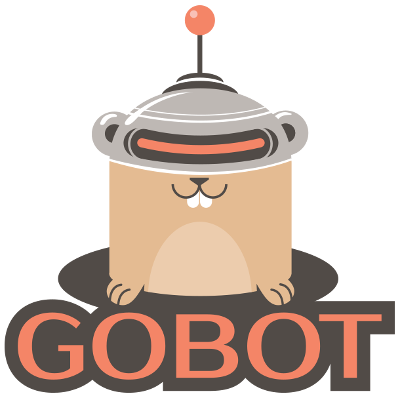Signed-off-by: deadprogram <ron@hybridgroup.com> |
||
|---|---|---|
| api | ||
| cli | ||
| drivers | ||
| examples | ||
| gobottest | ||
| platforms | ||
| scripts | ||
| sysfs | ||
| .gitignore | ||
| .travis.yml | ||
| CHANGELOG.md | ||
| CONTRIBUTING.md | ||
| LICENSE | ||
| Makefile | ||
| README.md | ||
| adaptor.go | ||
| commander.go | ||
| commander_test.go | ||
| connection.go | ||
| device.go | ||
| doc.go | ||
| driver.go | ||
| event.go | ||
| eventer.go | ||
| eventer_test.go | ||
| examples_test.go | ||
| helpers_test.go | ||
| master.go | ||
| master_test.go | ||
| robot.go | ||
| utils.go | ||
| utils_test.go | ||
| version.go | ||
README.md
Gobot (http://gobot.io/) is a framework using the Go programming language (http://golang.org/) for robotics, physical computing, and the Internet of Things.
It provides a simple, yet powerful way to create solutions that incorporate multiple, different hardware devices at the same time.
Want to use Javascript robotics? Check out our sister project Cylon.js (http://cylonjs.com/)
Want to use Ruby on robots? Check out our sister project Artoo (http://artoo.io)
Getting Started
Get the Gobot source with: go get -d -u github.com/hybridgroup/gobot/...
Examples
Gobot with Arduino
package main
import (
"time"
"github.com/hybridgroup/gobot"
"github.com/hybridgroup/gobot/drivers/gpio"
"github.com/hybridgroup/gobot/platforms/firmata"
)
func main() {
firmataAdaptor := firmata.NewAdaptor("/dev/ttyACM0")
led := gpio.NewLedDriver(firmataAdaptor, "13")
work := func() {
gobot.Every(1*time.Second, func() {
led.Toggle()
})
}
robot := gobot.NewRobot("bot",
[]gobot.Connection{firmataAdaptor},
[]gobot.Device{led},
work,
)
robot.Start()
}
Gobot with Sphero
package main
import (
"fmt"
"time"
"github.com/hybridgroup/gobot"
"github.com/hybridgroup/gobot/platforms/sphero"
)
func main() {
adaptor := sphero.NewAdaptor("/dev/rfcomm0")
driver := sphero.NewSpheroDriver(adaptor)
work := func() {
gobot.Every(3*time.Second, func() {
driver.Roll(30, uint16(gobot.Rand(360)))
})
}
robot := gobot.NewRobot("sphero",
[]gobot.Connection{adaptor},
[]gobot.Device{driver},
work,
)
robot.Start()
}
"Metal" Gobot
You can use the entire Gobot framework as shown in the examples above ("Classic" Gobot), or you can pick and choose from the various Gobot packages to control hardware with nothing but pure idiomatic Golang code ("Metal" Gobot). For example:
package main
import (
"github.com/hybridgroup/gobot/drivers/gpio"
"github.com/hybridgroup/gobot/platforms/intel-iot/edison"
"time"
)
func main() {
e := edison.NewAdaptor()
e.Connect()
led := gpio.NewLedDriver(e, "13")
led.Start()
for {
led.Toggle()
time.Sleep(1000 * time.Millisecond)
}
}
"Master" Gobot
You can also use the full capabilities of the framework aka "Master Gobot" to control swarms of robots or other features such as the built-in API server. For example:
package main
import (
"fmt"
"time"
"github.com/hybridgroup/gobot"
"github.com/hybridgroup/gobot/platforms/sphero"
)
func NewSwarmBot(port string) *gobot.Robot {
spheroAdaptor := sphero.NewAdaptor(port)
spheroDriver := sphero.NewSpheroDriver(spheroAdaptor)
spheroDriver.SetName("Sphero" + port)
work := func() {
spheroDriver.Stop()
spheroDriver.On(sphero.Collision, func(data interface{}) {
fmt.Println("Collision Detected!")
})
gobot.Every(1*time.Second, func() {
spheroDriver.Roll(100, uint16(gobot.Rand(360)))
})
gobot.Every(3*time.Second, func() {
spheroDriver.SetRGB(uint8(gobot.Rand(255)),
uint8(gobot.Rand(255)),
uint8(gobot.Rand(255)),
)
})
}
robot := gobot.NewRobot("sphero",
[]gobot.Connection{spheroAdaptor},
[]gobot.Device{spheroDriver},
work,
)
return robot
}
func main() {
master := gobot.NewMaster()
spheros := []string{
"/dev/rfcomm0",
"/dev/rfcomm1",
"/dev/rfcomm2",
"/dev/rfcomm3",
}
for _, port := range spheros {
master.AddRobot(NewSwarmBot(port))
}
master.Start()
}
Hardware Support
Gobot has a extensible system for connecting to hardware devices. The following robotics and physical computing platforms are currently supported:
- AR Drone 2.0 <=> Package
- Arduino <=> Package
- Audio <=> Package
- Beaglebone Black <=> Package
- Bebop <=> Package
- Bluetooth LE <=> Package
- C.H.I.P <=> Package
- Digispark <=> Package
- Intel Edison <=> Package
- Intel Joule <=> Package
- Joystick <=> Package
- Keyboard <=> Package
- Leap Motion <=> Package
- MavLink <=> Package
- MegaPi <=> Package
- MQTT <=> Package
- NATS <=> Package
- Neurosky <=> Package
- OpenCV <=> Package
- Particle <=> Package
- Pebble <=> Package
- Raspberry Pi <=> Package
- Sphero <=> Package
Support for many devices that use General Purpose Input/Output (GPIO) have
a shared set of drivers provided using the gobot/drivers/gpio package:
- GPIO <=> Drivers
- Analog Sensor
- Button
- Buzzer
- Direct Pin
- Grove Button
- Grove Buzzer
- Grove LED
- Grove Light Sensor
- Grove Piezo Vibration Sensor
- Grove Relay
- Grove Rotary Dial
- Grove Sound Sensor
- Grove Temperature Sensor
- Grove Touch Sensor
- LED
- Makey Button
- Motor
- Relay
- RGB LED
- Servo
Support for devices that use Inter-Integrated Circuit (I2C) have a shared set of
drivers provided using the gobot/drivers/i2c package:
- I2C <=> Drivers
- BlinkM
- Grove Digital Accelerometer
- Grove RGB LCD
- HMC6352 Compass
- JHD1313M1 RGB LCD Display
- LIDAR-Lite
- MCP23017 Port Expander
- MMA7660 3-Axis Accelerometer
- MPL115A2 Barometer
- MPU6050 Accelerometer/Gyroscope
- Wii Nunchuck Controller
More platforms and drivers are coming soon...
API:
Gobot includes a RESTful API to query the status of any robot running within a group, including the connection and device status, and execute device commands.
To activate the API, require the github.com/hybridgroup/gobot/api package and instantiate the API like this:
master := gobot.NewMaster()
api.NewAPI(master).Start()
You can also specify the api host and port, and turn on authentication:
master := gobot.NewMaster()
server := api.NewAPI(master)
server.Port = "4000"
server.AddHandler(api.BasicAuth("gort", "klatuu"))
server.Start()
You may access the robeaux React.js interface with Gobot by navigating to http://localhost:3000/index.html.
CLI
Gobot uses the Gort http://gort.io Command Line Interface (CLI) so you can access important features right from the command line. We call it "RobotOps", aka "DevOps For Robotics". You can scan, connect, update device firmware, and more!
Gobot also has its own CLI to generate new platforms, adaptors, and drivers. You can check it out at https://github.com/hybridgroup/gobot/cli.
Documentation
We're busy adding documentation to our web site at http://gobot.io/ please check there as we continue to work on Gobot
Thank you!
Need help?
- Join our mailing list: https://groups.google.com/forum/#!forum/gobotio
- IRC:
#gobotio @ irc.freenode.net - Issues: https://github.com/hybridgroup/gobot/issues
- twitter: @gobotio
Contributing
For our contribution guidelines, please go to https://github.com/hybridgroup/gobot/blob/master/CONTRIBUTING.md .
License
Copyright (c) 2013-2016 The Hybrid Group. Licensed under the Apache 2.0 license.

